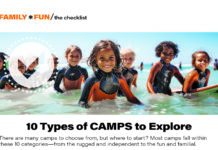Kids love animals, bugs, playing in the water, getting dirty — in a word, nature. Most camps incorporate nature activities into their programs, but some camps are geared specifically to nature activities.
Our region’s numerous woods, beaches, animal habitats and parks provide rich opportunities for kids to explore. Whether it’s kayaking, fishing, rock climbing or studying animals, there are hands-on experiences to match kids’ interests. Animals Are Popular
For 48 years, Camp Watonka in Hawley, PA has attracted boys ages 7-15 to its science and nature-focused program. The residential camp offers concentrations in botany, zoology, ecology and biology.
“Probably the most popular is working with the animals,” explains camp director Donald Wacke. Campers explore pond creatures, set up terrariums (a miniature landscape) and aquariums, and hatch wild fish. During night hikes children meet owls and learn about astronomy.
Wacke says kids discover natures’ many surprises, such as the time they set a trap for a woodchuck. It turned out that skunks like the same foods as woodchucks, and a skunk found its way into their trap. Luckily the children had learned that if they let the skunk go very carefully, it wouldn’t release its spray.
 Pick and Choose
Pick and Choose
Whether run privately or by the state park system, day camps offer experiences focused on individual interests. “There’s such diversity in our natural resources, families can attend multiple state park summer camp programs,” says Barbara Woodford, acting chief of programming for the Delaware State Parks, which provide more than a dozen week-long camps in seven parks.
Some of the most popular include rock climbing for 11- to 17-year-olds at Alapocas Run State Park, hands-on hikes and nature crafts for ages 4-6 at Bellevue State Park, and outdoor survival for 6- to 10-year-olds at Brandywine Creek State Park.
The camps even sometimes mesh the natural world with technology. “The reality is technology is part of our life and parents as well as children enjoy it,” says Woodford. “It can be a wonderful connector to our wild world.” For example, kids use a GPS to do a history hunt in the Outdoor Adventure Camp at Brandywine Creek State Park.
Environmental Education
Established in 2002, Project HEAL (Human, Environmental & Animal Links), operates Camp Creek Run in Marlton, NJ, which provides year-round environmental education programs for schools, scout troops and families. Their summer camp program is located on 50 wooded acres that were preserved through public and private grants.
 “We offer a wide-range of traditional and fun camp activities with environmental themes and programs woven in,” explains Keara R. Giannotti, the camp’s executive director. “Soccer games frequently come to a full stop when a camper spots a Fowler’s toad that needs a hand to get out of harm’s way!”
“We offer a wide-range of traditional and fun camp activities with environmental themes and programs woven in,” explains Keara R. Giannotti, the camp’s executive director. “Soccer games frequently come to a full stop when a camper spots a Fowler’s toad that needs a hand to get out of harm’s way!”
The camp’s Eco-Center is always open if a camper finds a moth he’s never seen before or a leaf he’d like to identify. Classes focus on topics that include stream and lake ecology, tree identification, birding, gardening, entomology and animal tracks and signs.
Convenient and Valuable
Similar to other camps, nature camps provide flexibility for families. Some day camps offer sessions as short as one week, allowing families to pick and choose programs, dates and locations. Residential camps offer a range of options between two and eight weeks. Young campers ages 4-6 usually attend half-day programs, but after-care is available.
The increased popularity in nature camps coincides with a growing national awareness of their value. Studies suggest that students who take part in environmentally themed lessons do better in science and other subjects.
In his 2005 book Last Child in the Woods, Richard Louv coined the term “nature-deficit disorder” and helped spark a national movement to get kids outdoors. Government initiatives have included Michelle Obama’s Let’s Move Campaign and the No Child Left Inside Act.
Matthew Barstead, Camp Program Director at YMCA Camp Tockwogh in Worton, MD, has undertaken a project to better define the impacts of residential summer camp on children. He cites studies that show outdoor education programs at quality environmental education centers provide kids with basic learning about the topic in a hands-on environment and, more deeply, give them a rich nature experience shared with peers.
Terri Akman is a local freelance writer.






